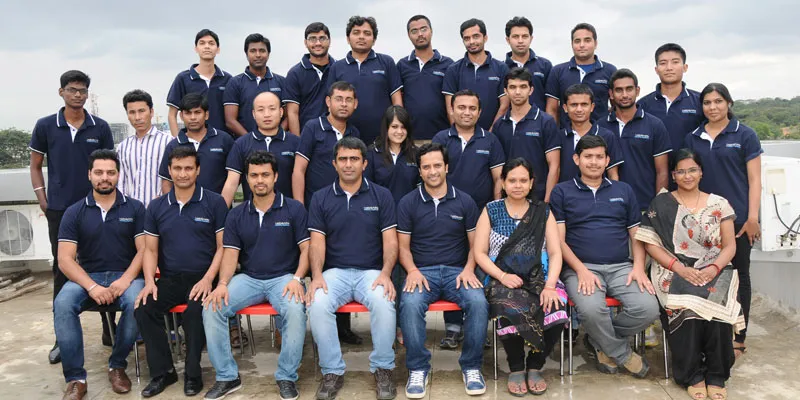How 42Gears increased its client base from 150 to 5000 in 5 years
Five years ago, Bengaluru-based 42Gears Mobility Systems had over 150 paying customers across 30 countries. In an earlier conversation with YourStory, Founders Onkar Singh and Prakash Gupta had said that they were poised for explosive growth in the next few years. Bang on their target, today 42Gears caters to more than 5000 clients in 90 countries, including big names like Coca-Cola, Canon, Morgan Stanley, Toyota, Lufthansa, Unilever, Siemens, HubSpot and Greenpeace.
Founded in 2009, 42Gears started their journey in a shared office space with a handful of employees. “Now we have a team spread across two offices in Bengaluru and Santa Clara, United States,” says Onkar, Co-founder of the venture. 42Gears caters to enterprises that use mobile devices for their businesses and claims that their solutions help organisations increase their efficiency and productivity.
Mobile device lock down and mobile device management are the two primary areas in which 42Gears offers solutions. “Our products are available on all major platforms -- Android, iOS and Windows. SureLock is one of the most popular lock down solutions,” adds Onkar.

The giant leap
Their initial clientele came from Europe and North America, with these regions still contributing the most to their top line, says Onkar. Now, 42Gears has added customers from Africa, the Middle East, Australia and New Zealand. “Interestingly, India has been contributing very little so far, but is now picking up fast,” says Onkar.
The main factor Onkar attributes to this growth is the uniqueness of their products and the quality of their solutions. The limited number of competitors in the space, who provide comprehensive solutions for company-owned devices, is an added boon.
The increasing popularity of Android-based devices has also enabled 42Gears to come up with Android-based solutions for enterprises.
Android devices have become affordable creating new use cases in areas where it was earlier unthinkable. This made us confident that the demand for our solutions would keep increasing in the years ahead, says Onkar.
Given that today, tablet sales have overtaken PC sales, every enterprise is already adopting a ‘Mobile First’ strategy. This, says Onkar, will ensure that there will be a whole new ecosystem of solutions based around tablets. The 42Gears team believes that their emphasis on strong partnerships with channel partners and OEMs is what helped them increase their footprint.
Currently, the team has seen a growth in the number of customers in the health care, transportation, education, hospitality, and entertainment verticals.

Also Read:
GSF mobile Accelerator announces next batch of eight Mobile, IoT startups
The growing mobility services segment
With most businesses focusing to go ‘mobile first’, there has been a growing demand for mobility services. Today, even content strategies are heading towards mobile platforms. However, the lack of expertise and the growing need of organisations to manage their mobile technologies are making them look for third-party mobility service providers. Analysts believe that the global mobility services market is poised to grow at 18.5 per cent in the next four years. Key players in the space include Cisco, AT&T, Accenture, Deloitte, Infosys and Wipro.
Initially, enterprise devices were Windows-based and were used as readers and scanners. With the growth of platforms like iOS and Android, user experience is at a whole new level now, resulting in the fast adoption of mobile technology for various kinds of businesses. “Earlier, the use of rugged devices was limited to certain areas and types of businesses. But today, no business can think of a strategy sans mobile devices,” says Onkar. The potential of the enterprise mobility market is currently pegged at $100 billion.
Today, even taxi services are giving away mobile phones to their drivers to connect with passengers, says Onkar. In the hospitality industry, tablets have become synonymous with information kiosks or survey terminals. Medical practitioners are also using them to keep a record of patient history. In the education sector, mobile devices are slowly replacing notebooks and reducing the use of paper.
Also Read:
From Internet of Things (IoT) to Economy of Things: new frontiers for startups
Growth and insights
While all verticals are eager to use mobile devices, 42Gears has seen more traction in the space of health care, transportation and hospitality. Geographically, their customers are mostly from North America and Europe, but other regions are fast catching up, says Onkar.
While we have more than 5000 customers today, our share of revenues from India is not much. But it is heartening to see a surge in the number of Indian enterprises that want to adopt mobile technology to get a competitive edge and for customer delight, he says.
42Gears is strengthening their US team and Onkar is relocating there to initiate this process. After this, the focus will be on developing other geographies. In the Middle East and Australia, they are working to get their channel partners in place. “We are working with some of the big tablet manufacturers for selling our solutions in India,” adds Onkar. “All our products will be IoT-ready in the coming few months. We will continue to evolve ourselves to be the one-stop shop providing mobility solutions for enterprises all over the world. We are getting the best talent on board. In fact, with the rate at which we are growing, we will soon need another new office,” concludes Onkar.







